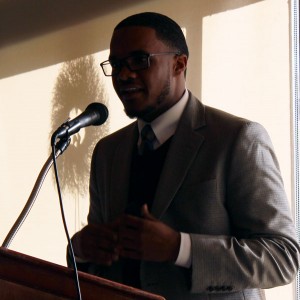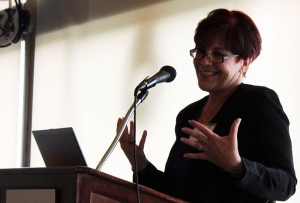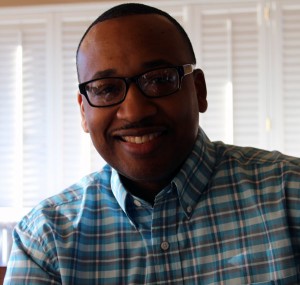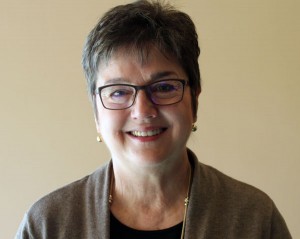Supported by the University of Michigan-Flint’s Education Department and a wide array of community and school partnerships, the Flint & Genesee Literacy Network is building momentum to address the complexities behind low literacy skills in the local population.
Initiated by Mott Community College, and structured by the Community Foundation of Greater Flint, the Literacy Network’s ambitious goals require uncommon collaboration to help ensure that children are entering school ready to learn, that they are succeeding in school, that they are prepared for and succeeding in post-secondary education, and that they will be prepared to eventually get good jobs with livable wages.
Director and Flint native JaNel Jamerson, who is a product of Flint Community Schools and holds a Master’s Degree in Education from UM-Flint, exudes a sense of contagious enthusiasm that has energized the Network’s membership.
“We’re still in the formative stages, but the contributions of each of us have made a difference,” he told members during a recent Literacy Network meeting at the Flint Golf Club. “We’re talking about creating a better quality of life for learners in Flint and Genesee County, and we have to approach this with a sense of urgency.”
In Flint and Genesee County, literacy remains a problem among youth and adults. According to the Literacy Network, up to 10% of adult residents live with low literacy skills, and 29% of fourth graders read below the state’s standard in reading. Being able to read by the third grade is often indicative of a child’s future success in school and beyond.
The National Center for Families Learning cites research that shows parental involvement is directly tied to student performance and is more influential on student success than socioeconomic background or the quality of schools. Addressing literacy concerns in adults, not just youth, has been identified as a crucial component of the planning process.
Associate Professor Mary Jo Finney, Director of UM-Flint’s Master of Arts with Secondary Teacher Certification Program, was keynote speaker at the Network’s recent meeting, and her research interests include the effects of trauma and the influences of the home environment on early childhood development. She discussed research about the positive effects on infants whose parents read to them on a regular basis, and also the importance of adults building a rapport with young readers.
Professor Finney encouraged Literacy Network members to have patience with the literacy project and to remain supportive of the people it serves. “This needs our unwavering support and our belief in their ability to advance as learners,” she said.
Dartanyan T. Jamerson, Director of MCC Workforce Development, believes the Literacy Network’s project will impact adults who seek to improve their employability in their chosen fields by improving their skill assessments. “The Literacy Network will expose shortcomings but will ultimately tell us where we can build bridges and improve our literacy rates,” he said. “Literacy affects many aspects of our lives, not just reading.”
With dedicated community partnerships in place, Network leaders formed action teams to efficiently grapple with issues surrounding low literacy rates and to do so with a research focus. These teams focus independently on the areas of family literacy, youth literacy, early childhood, career pathways, performance accountability, communications, and resource development.
Such a comprehensive collaborative process will take time, but Director JaNel Jamerson doesn’t want community partners to ever reach a point of complacency. “Trying hard is not good enough,” JaNel reminded Network members. “We must remain committed to responding to the urgent need of the community.”
Literacy action teams hope to utilize up-to-date local demographic data and economic indicators along the way. University Outreach at UM-Flint and the Geographic Information Center are developing a community-wide online data mapping project, funded by a grant from the C.S. Mott Foundation. The system, which will offer specific datasets and online mapping of publicly-available data, will be a vital analytical tool to community organizations like the Literacy Network.
Literacy teams are collaborating with the Flint Public Library, Christ Enrichment Center, and other entities on specific literacy initiatives. Some of these include the development of a family literacy toolkit, the Library’s Read-While-You-Wait project in local barbershops with participation from UM-Flint Education faculty, and after-school and summer learning programs for youth.
Kathi Horton, who is President of the Community Foundation of Greater Flint and serves on the Literacy Network’s steering committee, said that the people involved in the process understand that literacy is a core issue to the community moving forward. UM-Flint student interns and faculty have provided valuable leadership and knowledge along the way.
“U of M-Flint is one of the most pivotal partners in all of our efforts from the resource and data part to helping us determine what is the best practice for teaching reading,” she said.




